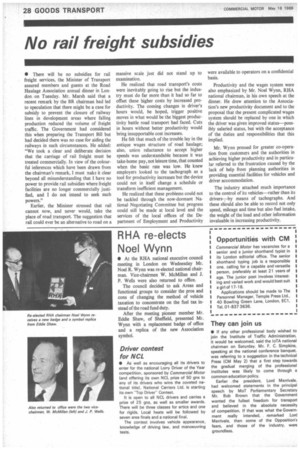No rail freight subsidies
Page 30

If you've noticed an error in this article please click here to report it so we can fix it.
• There will be no subsidies for rail freight services, the Minister of Transport assured members and guests at the Road Haulage Association annual dinner in London on Tuesday. Mr. Marsh said that a recent remark by the BR chairman had led to speculation that there might be a case for subsidy to prevent the closure of railway lines in development areas where falling production reduced the volume of freight traffic. The Government had considered this when preparing the Transport Bill but had decided there was no case for aiding the railways in such circumstances. He added: "We took a clear and deliberate decision that the carriage of rail freight must be treated commercially. In view of the colourful inferences which have been drawn from the chairman's remark, I must -nake it clear beyond all misunderstanding that I have no power to provide rail subsidies where freight facilities are no longer commercially justified, and I do not intend to seek such powers."
Earlier, the Minister stressed that rail cannot now, and never would, take the place of road transport. The suggestion that rail could ever be an alternative to road on a massive scale just did not stand up to examination.
He realized that road transport's costs were inevitably going to rise but the industry must do far more than it had so far to offset these higher costs by increased productivity. The coming changes in driver's hours would, he hoped, trigger positive moves in what would be the biggest productivity battle road transport had faced. Cuts in hours without better productivity would bring insupportable cost increases.
He felt that much of the trouble lay in the antique wages structure of road haulage; also, union reluctance to accept higher speeds was understandable because it was take-home pay, not leisure time, that counted when the basic rate was low. He knew employers looked to the tachograph as a tool for productivity increases but the device could not in itself change a schedule or transform inefficient management.
He realized that these problems could not be tackled through the now-dormant National Negotiating Committee but progress could still be made at local level and the services of the local offices of the Department of Employment and Productivity were available to operators on a confidential basis.
Productivity and the wages system were also emphasized by Mr. Noel Wynn, RHA national chairman. in his own speech at the dinner. He drew attention to the Association's new productivity document and to the proposal that the present complicated wages system should be replaced by one in which the driver was given improved status—possibly salaried status, but with the acceptance of the duties and responsibilities that this implied.
Mr. Wynn pressed for greater co-operation from customers and the authorities in achieving higher productivity and in particular referred to the frustration caused by the lack of help from planning authorities in providing essential facilities for vehicles and driver accommodation.
The industry attached much importance to the control of its vehicles—rather than its drivers--by means of tachographs. And these should also be able to record not only speed, mileage and time but also fuel intake, the weight of the load and other information invaluable in increasing productivity.






















































































































